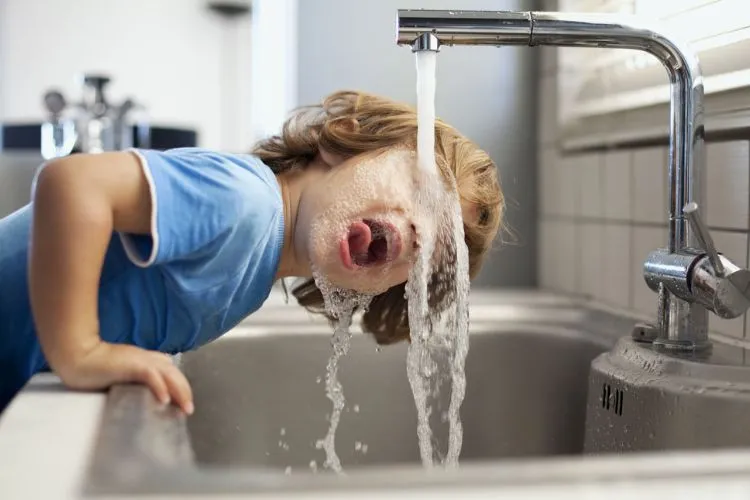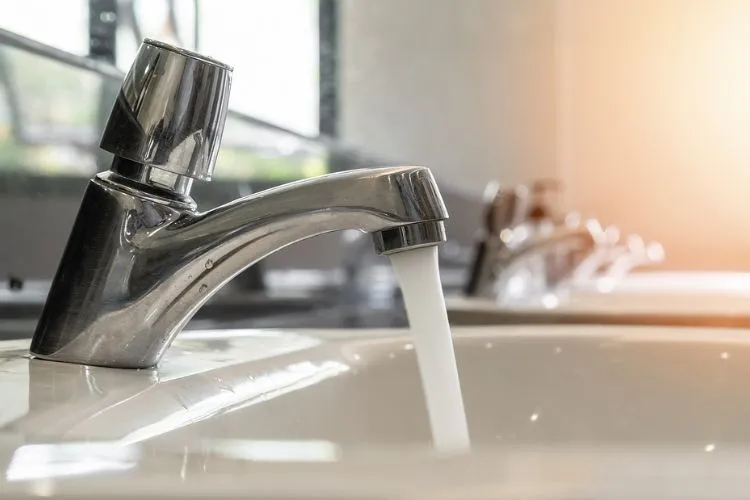Ensuring the safety of tap water is crucial due to its direct impact on health.
Houston, being a large and diverse city, attracts attention when it comes to the quality of its public utilities, including its tap water.
So, is Houston tap water safe to drink?

💦 Is Houston Tap Water Safe to Drink?
Yes, Houston tap water is completely safe to drink as it doesn’t contain any harmful contaminants which can reduce the quality.
Houston draws its water from surface sources such as lakes, rivers, and reservoirs. These bodies of water undergo a rigorous purification process before reaching Houston’s taps.
The process includes filtration and disinfection, adhering to strict regulations set by the Environmental Protection Agency (EPA) and monitored locally by the Texas Commission on Environmental Quality.
This framework ensures that contaminants are removed effectively to provide safe drinking water.
💦 Current Status of Houston’s Tap Water
Recent evaluations show that Houston’s tap water complies with federal and state drinking water standards.
The City’s annual Water Quality Report outlines levels of various substances, including lead and chlorine, and compares them against the regulatory limits.
These reports confirm that the city consistently meets safety benchmarks and often surpasses requirements.
💦 Factors Affecting Water Quality in Houston
Water quality can fluctuate due to natural and human activities. Seasonal changes can introduce more pollutants into water sources, especially after heavy rainfall or hurricanes.
Flooding can lead to increased runoff from industrial and agricultural areas, potentially introducing contaminants into water sources.
Additionally, Houston’s aging water infrastructure may pose challenges, as older pipes can leach harmful substances like lead into the water supply before it reaches consumers.

💦 Common Concerns Regarding Tap Water Safety
Concerns about lead in the water are prevalent in areas with older infrastructure. Since lead mainly comes from plumbing, houses built before 1986 (when lead pipes were banned) might be at higher risk.
Chlorine, commonly used for disinfection, can react with natural organic materials in the water, forming byproducts like trihalomethanes which are monitored due to health concerns.
Emerging issues such as per- and polyfluoroalkyl substances (PFAS) are also under scrutiny, though they are not yet regulated nationwide.
💦 How to Ensure the Safety of Your Tap Water
Homeowners can take proactive steps to ensure their drinking water’s safety. Flushing out pipes by running cold water every morning, especially if the water was stagnant overnight, can help reduce potential contaminants.
Water filtration systems, such as carbon filters or reverse osmosis systems, can effectively remove chemicals and pathogens from tap water.
Periodic water testing, available through local health departments or private labs, provides insights specific to one’s own plumbing system.
💦 Alternatives to Tap Water
While tap water in Houston is generally safe, some may opt for bottled water or advanced filtering systems for added peace of mind. Bottled water, although regulated by the FDA, can be more expensive and less eco-friendly than tap water.
Point-of-use systems, installed at taps where water is drawn for drinking or cooking, provide another layer of filtration that can address particular contaminants of concern.
💦 Public Initiatives and Future Prospects
Houston continues to invest in water quality improvements through infrastructure upgrades and rigorous testing.
New technologies and continuing research promise to enhance water treatment processes and contaminant detection.
Consumer awareness and community involvement in water management also play crucial roles in maintaining high standards of water safety.
💦 The Future of Water Safety in Houston
The future of water safety in Houston is poised at an intersection of challenges and opportunities, with population growth amplifying the demand on water resources and necessitating advanced solutions to ensure a safe, sustainable supply.
Technological advances offer promising prospects, from innovative filtration systems capable of removing even the most stubborn contaminants to smart sensors for real-time water quality monitoring.
Policy shifts toward stronger environmental protections could further enhance water safety, mandating stricter standards and more efficient practices.
However, adapting to these changes requires proactive investments in infrastructure and research, along with a collective commitment to environmental stewardship.
As Houston navigates these complexities, the city’s approach to managing water safety will likely become a benchmark for others facing similar challenges.

💦 The Role of Infrastructure in Water Quality
The city’s water infrastructure, encompassing treatment plants and distribution networks, is fundamental to maintaining water quality in Houston. These facilities ensure that water from natural sources is treated to meet safety standards before it reaches households.
However, aging infrastructure presents significant challenges, including the risk of pipe leaks and breaks that can lead to contaminants entering the system. To address these concerns, Houston is investing in the modernization of its water infrastructure.
This includes replacing old pipes, upgrading treatment facilities with advanced technologies, and implementing smart systems for leak detection and water quality monitoring.
These solutions not only aim to enhance the resilience of water infrastructure against physical degradation but also ensure the consistent delivery of safe, clean water to the city’s residents.
💦 Frequently Asked Questions (FAQs)
How often is Houston’s tap water tested for contaminants?
Houston’s water is tested regularly in accordance with EPA regulations, ensuring ongoing compliance with safety standards.
What should I do if I’m concerned about lead in my tap water?
If you suspect lead contamination, particularly in older homes, consider getting your water tested and explore options for lead-removing filters.
Is filtered tap water safer than bottled water?
Filtered tap water can be safer and more cost-effective than bottled water, provided the filters used are appropriate for targeted contaminants.
How can natural disasters affect tap water safety?
Natural disasters can disrupt water purification processes and introduce pollutants. It’s advised to follow local advisories for boiling or treating water after significant weather events.
Where can Houston residents find the latest water quality reports?
Residents can access the most recent water quality reports on the City of Houston’s official website or through the EPA’s portal.
Conclusion:
Houston’s tap water is generally considered safe to drink.
Official reports confirm compliance with national and state standards, reflecting the effectiveness of the city’s rigorous water management practices.
Nonetheless, residents must remain informed and proactive in managing their household water to handle infrastructure aging and the rare cases of contamination.

Devon Shorts, a seasoned expert with over a decade of experience in water safety, shares valuable insights on this blog “Aqua Safety Plus”. Trust his expertise to keep your water clean and your family safe.
